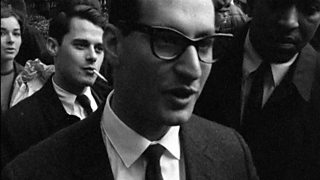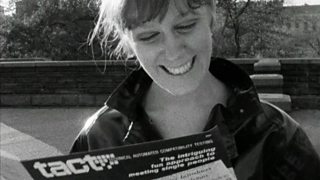
"We matched an older brother with his younger sister": The rocky 1960s origins of online dating
- Published By The Statesman For The Statesman Digital
- 7 months ago
In 1966, the BBC's Tomorrow's World visited a party in New York organised by the electronic dating service Tact, or Technical Automated Compatibility Testing. Around 2,000 singles were invited to Manhattan to try out this modern method of matchmaking.
In 1788, a man going by the name of "AB" placed New York's first known personal ad in the Impartial Gazetteer, according to historian Francesa Beauman. He was seeking a woman "under 40, not deformed, and in possession of at least one thousand pounds". Describing himself as "a young gentleman of family and fortune, who is lately come to town", the ad was the Tinder bio of its day. Whether AB had any replies to his ad is unknown. But nearly 200 years later, New York was the home of another novel approach to dating – computer matchmaking.
Invented by Bob Ross (a computer programmer at IBM, not the painter), and accountant Lewis Altfest, Tact – or Technical Automated Compatibility Testing – launched in New York 60 years ago, in 1965. First confined to the Upper East Side, it soon expanded to the entire city and had thousands signing up to be matched by computer. Each hopeful had to pay $5 (£2) and fill in a questionnaire, which would then be used to match people "on three levels", according to Ross: socio-cultural factors, opinions and values, and psychological factors. The answers were fed into the computer, which would then spit out supposed matches of the opposite gender. Same-sex dating was not an option. "Tact is not a lonely-hearts club," Ross told the BBC's Tomorrow's World. "It's not a marriage brokerage service. It's a new fun way of meeting new people." He pointed out that it was open to "all fun-loving people between 18 and 45", and added: "People go into Tact for a number of reasons. Some of the people go into it just to meet new people, to get a lot of dates… some people want to get more serious, they are interested in forming a more lasting relationship, and then there are people who just want to get married."

The matchmaking questions were approved by psychologist Dr Salvatore V Didato, who felt there was "a great social need" for services such as Tact. He complained of other services, "They say that they match people on many, many variables, but it winds up that they match them only on age, sex, religion, and height, or something like that." The Tact questionnaire went further by including a series of statements with which respondents had to either agree or disagree. The BBC report features responses from a typical customer: "I worry over my relationships with people – yes. I enjoy people who express affection freely – yes. Most of the time I act as an independent – no. I enjoy going to parties – yes."
While Tact was at the crest of a new technological wave, it was not quite the first computer-aided dating service. The two inventors had been inspired by Operation Match, which had been started earlier that year by Harvard students – decades before some students at the same university would create another computer-powered way for people to connect: Facebook.
In 1965, computers were still novel. Operation Match had to rent one of the university's computers for $100 an hour. It quickly proved popular, with thousands of students sending in questionnaires. "You thought the computer was god, and the computer knew all," co-creator Jeff Tarr told the BBC's Witness History in 2014. Coincidentally, Tarr's daughter would go on to marry one of the creators of Match.com, one of the first internet dating sites. The computer provided reassurance: instead of relying on luck when finding your partner, you could be algorithmically matched to your soulmate.

The 1960s were a time of revolution. In the United States, the civil rights and second wave feminism movements were in full flow. Social norms were changing, and technology was developing quickly, too: the arrival of the computer coincided with society's increased permissiveness. By 1969, computer dating – or at least the idea of it – was mainstream enough to feature as a storyline in Bewitched, the supernatural sitcom. Samantha's cousin Serena (Elizabeth Montgomery plays both characters) signs up to a computer dating service to find a mortal to marry, only to be matched with a warlock. Even Bob Ross himself found love through Tact – although it wasn't thanks to the computer. According to a New Yorker article published in the New Yorker in 2011, he eventually married a journalist who interviewed him about the project.
Tact's thousands of willing customers signalled a shift away from the more formal courtship culture of the first half of the century, and towards more modern attitudes. However, these early computer matchmaking services did not last long. While some people found their perfect partners, the services had a few fatal limitations. Because the services were primarily aimed at middle-class college students and graduates, there was a finite pool of potential matches. Also, the system was inefficient – it could be weeks between sending off your questionnaire and receiving your matches, who you then had to contact by phone or post. The parties organised by Tact were an attempt to get matches to mingle despite the distances that might be involved. Even then, it could still be awkward. The BBC's report pointed out that even "a public relations man present couldn't get this party going until after dark," despite a prize of "a big night out on the town" for the most compatible couple present. Possibly the paper sign hung between two bins did not inspire confidence in the service.
True love and artificial intelligence
The questions left something to be desired, too. As well as all the basic demographic and attraction-related queries, the form's "dislikes" section had options such as "homosexuals" and "interracial couples". The questionnaire also played to stereotypes: according to the New Yorker, men were asked to rank women's hairstyles, whereas women could specify where they could find their ideal man: chopping wood, painting in a studio, or in a garage.
While the creators were proud of the detail in their "three levels" of compatibility testing, their Cupid's arrows weren't always on target. "We matched an older brother with his younger sister," admitted Ross. "That didn't work out too well." He also said they'd had "a number of people who weren't too satisfied after they've gone out". On Tomorrow's World, one potential client quizzed Dr Didato on the robustness of the matching computer, after a bad experience with another service. "She specified an age limit and gets some guy 20 years older!"
Still, while Tact, Operation Match and other similar services now seem comparatively quaint, people keep using technology to guide them towards romance – from the first personal ads in newspapers to video dating services, from online dating sites to AI-aided apps. According to Pew Research, one in 10 people who had partners in the US in 2023 met them via online dating. When it comes to matters of the heart, it seems, we can't help falling in love with the latest innovations.
Share on
Tags
SHARE YOUR COMMENT
MORE STORIES FOR YOU
Trending Stories
DJ Mo’s former illicit lo...
- Published By Jane
- January 15, 2024
Mapenzi! Zari and Tanasha...
- Published By Jane
- October 24, 2023
Zuchu Speaks on Diamond P...
- Published By Jane
- October 12, 2023
Hio Ni Upumbavu Wasituche...
- Published By Jane
- November 8, 2023
RECOMMENDED FOR YOU
Your Lungs Hold Secrets A...
- Published By The
- September 11, 2025
Better Sleep?: See The Li...
- Published By The
- September 11, 2025
What to Know About iPhone...
- Published By The
- September 11, 2025
From Teacher to Mwalimu N...
- Published By The
- September 11, 2025
Latest Stories
15 Early Signs and Sympto...
- Published By The
- September 14, 2025
The 7 Best Weight Loss Me...
- Published By The
- September 14, 2025
"Walibebwa": Salah Scores...
- Published By The
- September 14, 2025
Shock as CA Revokes Lice...
- Published By The
- September 14, 2025



